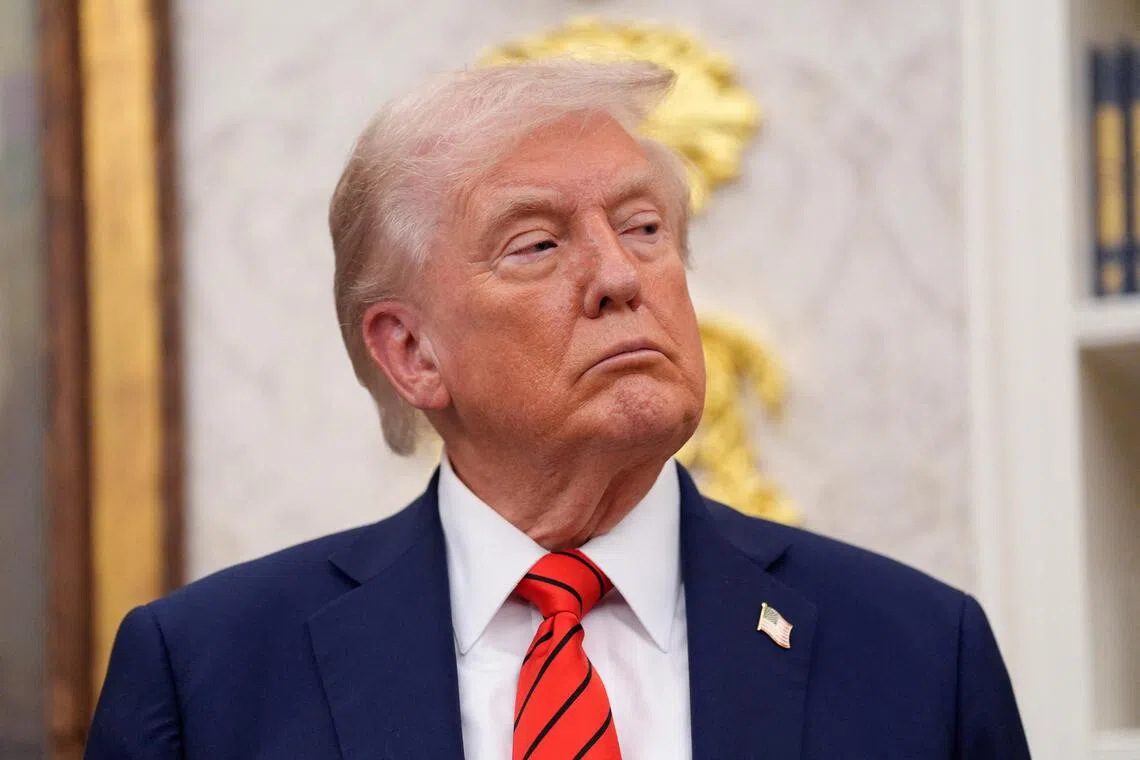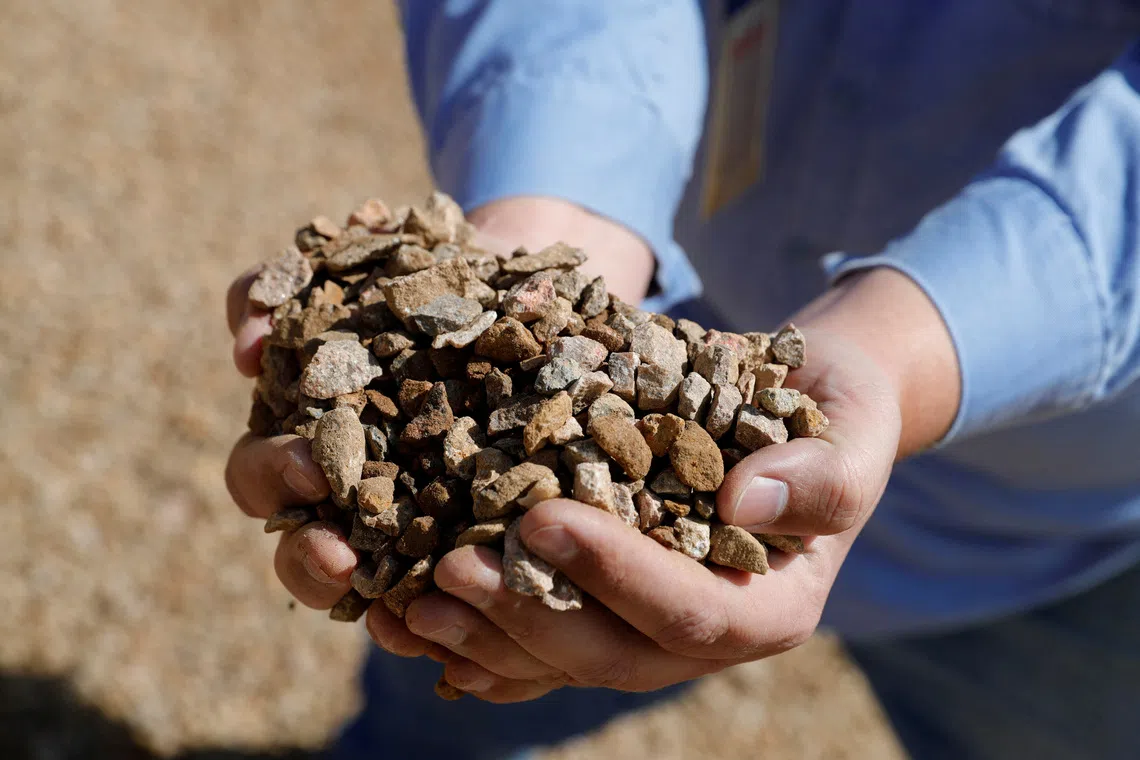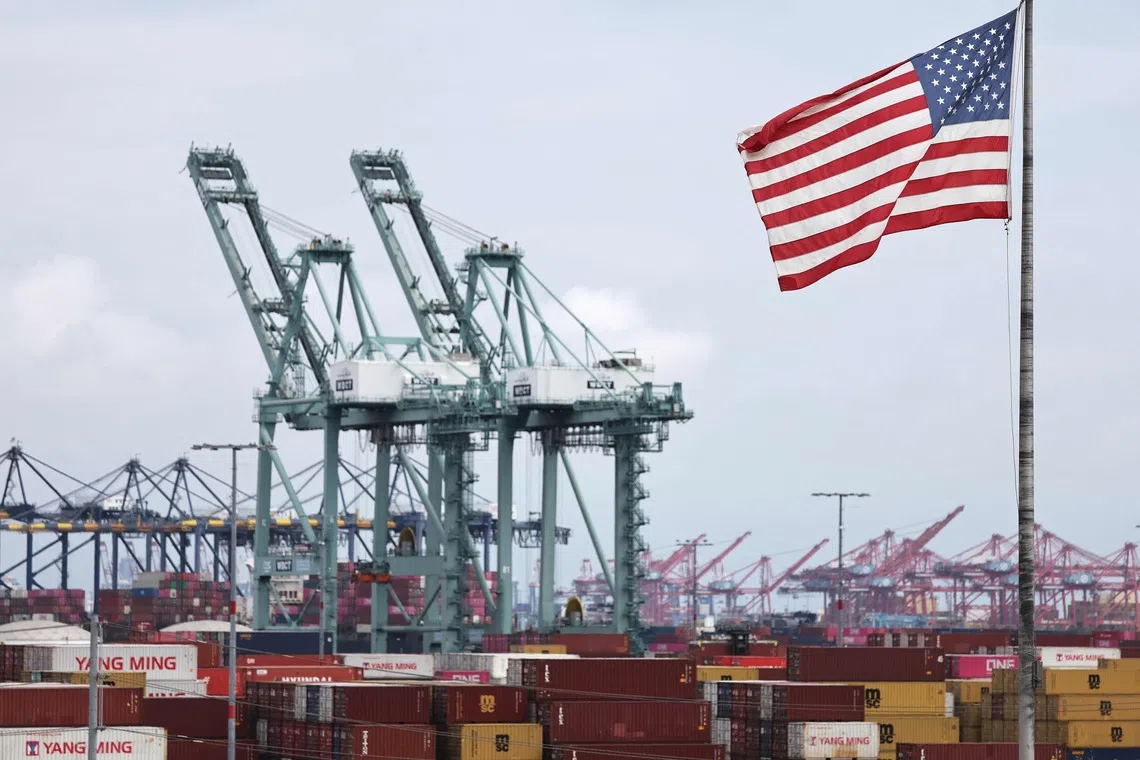Trump ratchets up US-China trade war with new 100% tariffs, export controls
Sign up now: Get ST's newsletters delivered to your inbox

US President Donald Trump on Oct 10 said he was raising tariffs on Chinese exports to the US to 100 per cent and imposing export controls on “any and all critical software”.
PHOTO: REUTERS
WASHINGTON - US President Donald Trump revived the trade war against Beijing on Oct 10, ending an uneasy truce between the two largest economies with promises to sharply hike tariffs in a reprisal against China curbing its critical mineral exports.
The president unveiled additional levies of 100 per cent on China’s US-bound exports, along with new export controls on “any and all critical software” by Nov 1, nine days before existing tariff relief is set to expire.
Mr Trump also called into question the prospects for a previously announced meeting set for three weeks from now with Chinese President Xi Jinping in South Korea, saying on Truth Social that “now there seems to be no reason to do so”.
“I haven’t cancelled,” Mr Trump later told reporters at the White House. “I would assume we might have it.” Beijing has never confirmed the meeting.
The new trade steps were Mr Trump’s reaction to China dramatically expanding its rare earth element export controls. China dominates the market for such elements, which are essential to tech manufacturing.
“It was shocking,” Mr Trump said of China’s steps, which did not specifically target Washington. “I thought it was very, very bad.”
The actions signalled the biggest rupture in relations in six months between Beijing and Washington - the world’s biggest factory and its biggest consumer. Many questioned whether an uneasy economic detente reached over the summer can survive.
It was a swift and dramatic response by Mr Trump, a Republican who has wielded tariffs paid by US importers against friends and foes. It could escalate a trade war that Washington and Beijing paused earlier this year after painstaking diplomacy. Experts said restrictions on US software shipments to China could be a massive blow to the country’s tech industry, including cloud computing and artificial intelligence.
Mr Trump also threatened new export controls on airplanes and airplane parts, and a person familiar with the matter said the administration was sketching out other possible targets.
Beijing has long called for Washington to abandon unilateral trade restrictions it says undermine global commerce.

On Oct 9, China dramatically expanded its rare earth element export controls.
PHOTO: REUTERS
Markets tumble on tariff threats
China produces over 90 per cent of the world’s processed rare earths and rare earth magnets. Many are vital materials in products ranging from electric vehicles to aircraft engines and military radars.
Mr Trump’s unexpected broadside shook global financial markets, sending the benchmark S&P 500 Index sliding by more than 2 per cent, its biggest one-day drop since April when a steady barrage of tariff announcements by Mr Trump stoked market volatility.
Investors fled into the safe haven of gold and US Treasury securities, and the U.S. dollar weakened against a basket of foreign currencies.
“Trump’s post could mark the beginning of the end of the tariff truce,” said Mr Craig Singleton, a China expert at the Foundation for Defense of Democracies. Mr Singleton said Washington viewed China’s export control steps as a betrayal. “Beijing appears to have overplayed its hand.”
In his first social media post on Oct 10, Mr Trump said China has been sending letters to countries worldwide saying it planned to impose export controls on every element of production related to rare earths.
He said he had been contacted by unnamed countries incensed over Beijing’s steps and said he was surprised because of the “very good” recent relationship with China.
Trump condemns Beijing’s ‘hostile order’
Terming China’s actions a “hostile order”, Mr Trump said he had been forced “to financially counter their move”.
“For every Element that they have been able to monopolise, we have two,” Mr Trump said.
His follow-up post announcing the levies made no mention of whether he would meet Mr Xi in the coming weeks. But earlier on Oct 10, Mr Trump had said: “I was to meet President Xi in two weeks, at Apec, in South Korea, but now there seems to be no reason to do so.”
Previously, Mr Trump had said he would meet Mr Xi on the sidelines of the Asia-Pacific Economic Cooperation forum being held in Gyeongju, South Korea, starting Oct 31.
The White House and the Chinese embassy in Washington did not immediately respond to a request for comment.
A spokesperson for the US Trade Representative declined comment on what countermeasures Mr Trump was contemplating while a spokesperson for the US Treasury did not immediately respond to a request for comment. The two offices have led talks with Beijing on trade.

US President Donald Trump on Oct 10 said he was raising tariffs on Chinese exports to the US to 100 per cent.
PHOTO: AFP
Economic tensions had been rising in recent days. On Oct 9, the Trump administration proposed banning Chinese airlines from flying over Russia
On Oct 10, the US Federal Communications Commission said on major US online retail websites have removed millions of listings for prohibited Chinese electronics.
China’s move on Oct 9 included adding five new elements as well as dozens of pieces of refining technology to its export-restricting control list. It also required foreign rare earth producers that use Chinese materials to comply with its rules.
“Beijing must have concluded that the US was not prepared to make significant concessions on tariffs, export controls or Taiwan,” said Mr Scott Kennedy, a China business and economics expert at Washington’s Centre for Strategic and International Studies think tank.
China calculated, he said, that if Mr Trump retaliates, “China will be in a better position to weather the storm, and that the US will be the first to back down.” REUTERS


